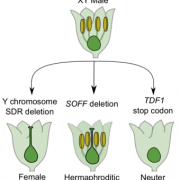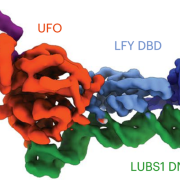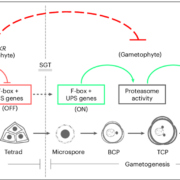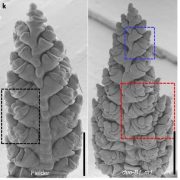A silk-expressed pectin methylesterase confers cross-incompatibility between wild and domesticated strains of Zea mays (bioRxiv)
 The key event for speciation is reproductive isolation. In sexually reproducing plants, genetic factors act as reproductive barriers preventing the interbreeding of related strains. In this study, Lu et al. aimed to explore how the Tcb1-s (Teosinte crossing barrier 1-s) haplotype, found exclusively in wild teosinte, blocks maize pollen fertilization. Using mixed pollination tests with knockout mutants, as well as genetic and genomic data, the authors demonstrate the Tcb1-s has functional male and female genes that enable self-type fertilization, but prevent pollination by pollen carrying the tcb1 haplotype found in almost all maize lines. The results reveal the barrier role of the female gene in Tcb1-s lines, since it encodes a pectin methylesterase expressed by the pistil, which affects the cell wall of the pollen tube and compromises fertilization. This work creates a paradigm for future studies of speciation mechanisms in other plants, which may be useful to manage pollen contamination for crop improvement techniques. (Summary by Ana Valladares) bioRxiv
The key event for speciation is reproductive isolation. In sexually reproducing plants, genetic factors act as reproductive barriers preventing the interbreeding of related strains. In this study, Lu et al. aimed to explore how the Tcb1-s (Teosinte crossing barrier 1-s) haplotype, found exclusively in wild teosinte, blocks maize pollen fertilization. Using mixed pollination tests with knockout mutants, as well as genetic and genomic data, the authors demonstrate the Tcb1-s has functional male and female genes that enable self-type fertilization, but prevent pollination by pollen carrying the tcb1 haplotype found in almost all maize lines. The results reveal the barrier role of the female gene in Tcb1-s lines, since it encodes a pectin methylesterase expressed by the pistil, which affects the cell wall of the pollen tube and compromises fertilization. This work creates a paradigm for future studies of speciation mechanisms in other plants, which may be useful to manage pollen contamination for crop improvement techniques. (Summary by Ana Valladares) bioRxiv









